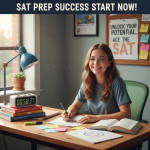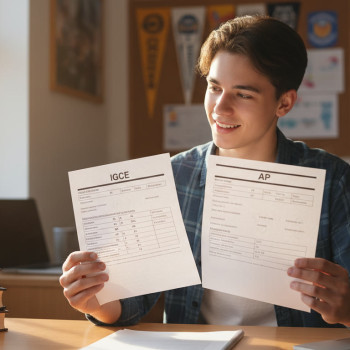Why Teacher Conferencing Matters for AP Students
You study, you practice past free-response questions, you memorize formulas — but how do you know you’re improving in the right direction? That’s where teacher conferencing comes in. A focused 10–20 minute meeting with your AP teacher can be the difference between repeating the same mistakes and making measurable progress. Targeted feedback turns effort into results: it clarifies what to prioritize, shows how rubrics are actually applied, and pinpoints small changes that yield big score improvements.

The hidden power of short, regular conferences
Long study sessions are important, but frequent short conferences provide course-correcting feedback that keeps your study efficient. Think of conferences as tune-ups: small, regular adjustments prevent you from wasting weeks on ineffective strategies. They let you:
- Confirm which skills the rubric rewards most.
- Receive concrete examples of what “clear analysis” or “effective thesis” looks like for your course.
- Get teacher-specific insights—how your teacher grades, what they emphasize, and where students commonly lose points.
Plan Your Conference: Before You Ask
Walking into a meeting without a goal wastes both your time and your teacher’s. Preparation signals seriousness and increases the chance you’ll leave with tangible next steps.
Decide your single most important objective
Don’t ask for general feedback. Pick one targeted objective. Examples:
- “I want to improve my thesis statements on AP Literature timed essays.”
- “Help me balance evidence and analysis on Document-Based Questions (DBQ).”
- “What specific problems cost me points on the last AP Calculus free-response?”
Bring the right materials
Show, don’t tell. Bring a recent graded piece, the rubric if available, and a clean copy of the prompt or problem. If time permits, bring a 1-page list of your top three concerns so the teacher can quickly see what you want to address.
Sample pre-conference email (10–20 seconds to write)
Subject: Request for a 10-minute conference about my AP Biology FRQ
Body: Hi Ms. Rivera — could I meet after class tomorrow for 10 minutes about my recent FRQ score? I’d like targeted feedback on how to structure my evidence and reduce factual errors. I’ll bring the graded work. Thanks!
During the Conference: Make Minutes Count
A good conference is a focused conversation, not a monologue. Use your time to learn how to change behavior, not just to learn what went wrong.
Follow this four-step framework
- Start with a one-sentence summary of your goal. Example: “I want my synthesis essays to have clearer claims.”
- Ask for specific evidence. Request the teacher point to one or two spots in your work that exemplify the problem.
- Ask for an actionable fix. What can you do in the next week to demonstrate improvement?
- Confirm one measurable next step. Set a short assignment or checklist to track progress before the next conference.
High-value questions to ask (use 2–4 per meeting)
- “Which sentence(s) in this paragraph made my point unclear?”
- “If I had 2 more minutes, where should I expand or refine my answer?”
- “What’s one way to revise this thesis so it’s defensible and specific?”
- “Which rubric category lost the most points and why?”
- “Can you model a 1–2 sentence revision that would raise this section?”
Examples: How Targeted Feedback Transforms Work
Below are small real-world examples showing how a focused conference can lead to big gains.
Example 1 — AP English Language: Thesis Precision
Student issue: vague thesis that restates the prompt. Teacher feedback: thesis needs a clear claim, lens, and roadmap. Actionable fix: practice writing 3 thesis variations—defensive, qualifying, and complex—and get quick teacher checks. Result: in the next timed essay the student’s thesis earned the “clear claim” points and allowed stronger paragraph development.
Example 2 — AP U.S. History: Using Evidence Strategically
Student issue: listed facts with little connection to the argument. Teacher feedback: group evidence by theme and explain how each piece supports the claim. Actionable fix: annotate documents with a one-line note on how it contributes to the thesis. Result: DBQ score improved because paragraphs were coherent and evidence was tied explicitly to claims.
Templates and Checklists You Can Use
Here are ready-to-use templates to bring into conferences. Print or copy them into a note app so you’re always prepared.
10-Minute Conference Checklist
| Step | Action | Time |
|---|---|---|
| 1 | State your single objective | 30 sec |
| 2 | Teacher points to targeted examples | 3 min |
| 3 | Discuss a clear revision or strategy | 4 min |
| 4 | Agree on one measurable next step | 1 min |
| 5 | Confirm follow-up and thank teacher | 1–2 min |
Sample Follow-Up Plan (1 week)
- Day 1: Revise the highlighted paragraph using teacher’s example.
- Day 3: Complete 1 timed practice focusing only on that skill.
- Day 6: Send a 2–3 sentence reflection to the teacher showing what changed.
Common Obstacles—and How to Overcome Them
Conferences are powerful, but a few pitfalls can limit their usefulness. Anticipate and eliminate these stumbling blocks so each meeting is a step forward.
Pitfall: Asking for too much at once
Fix: Prioritize one skill. You can schedule future conferences for other issues.
Pitfall: Leaving without measurable next steps
Fix: Always agree on a single, specific task you’ll complete before the next meeting (e.g., “Revise two paragraphs and bring a timed rewrite”).
Pitfall: Not using the teacher’s language
Fix: Mirror rubric terms when possible. If your teacher says “analysis” or “argument development,” ask how your work measures up against those exact categories.
How to Use Teacher Feedback in Your Study Plan
Feedback only matters if you act on it. Integrate what you learn in conferences into your weekly study plan so improvement compounds.
Integrate feedback into practice cycles
Use a simple cycle: Practice → Conference → Revise → Repeat. After a conference, do a focused practice session that applies the teacher’s suggestion, then submit your revised piece or a short reflection. This loop is the fastest way to convert feedback into skill.
Weekly study template with teacher feedback
| Day | Activity | Purpose |
|---|---|---|
| Monday | Timed practice (focus area) | Apply strategy under pressure |
| Wednesday | Conference or quick check-in | Get targeted corrections |
| Friday | Revision and reflection | Consolidate changes |
When to Ask for Extra Help: Strategic Moments
Some moments offer higher ROI for conferences. Prioritize teacher time around these:
- After initial graded practice for a new unit.
- Before a major assessment or mock AP exam.
- When a pattern of errors emerges across multiple assignments.
- When you’re within 6–8 weeks of the AP exam date—use conferences to tighten scoring weaknesses.
Measuring Progress: What Success Looks Like
Progress is about more than a higher percentage on a single assignment—it’s about consistent improvement on rubric categories and the ability to purposefully correct mistakes.
Simple metrics to track
- Rubric categories improved (e.g., from 1/4 to 3/4 in Evidence/Commentary).
- Average score on timed practices over a month.
- Number of conferences converted into measurable next steps and completed revisions.
How Personalized Tutoring Enhances Conferences
Teacher conferencing is invaluable, but sometimes you need extra practice between meetings. Personalized tutoring—like Sparkl’s 1-on-1 guidance—can multiply the impact of teacher feedback. Tutors can provide tailored study plans, model the suggested revisions in additional practice sessions, and offer AI-driven insights to track progress between your classroom conferences and the AP exam.
When to combine tutoring with teacher conferencing
- If you need extra timed-practice cycles to internalize the teacher’s advice.
- When a teacher suggests a targeted skill (e.g., synthesis of evidence) but you want more examples and coaching to master it.
- To create a custom revision plan that aligns with teacher expectations and the AP rubric.
Sample Conference Script: Turn Nervousness into Clarity
Use this short script to run a smooth conference. Practice it once so it feels natural.
- You: “Hi Mr. Chen—do you have ten minutes after class? I want focused feedback on my last AP Calculus FRQ, specifically where I lost points for explanation versus algebraic work.”
- Teacher: (points to section) “Here you showed the right steps but the justification was brief.”
- You: “Could you show me a two-sentence justification I could use next time?”
- Teacher: (gives an example). You: “Thank you—can I email you a revised version this week for a quick check?”
Putting It All Together: A Two-Month Improvement Roadmap
If you’re serious about raising your AP performance, follow this roadmap for two months before your exam or major mock test.
Week-by-week goals
- Weeks 1–2: Baseline timed practices in areas you want to improve; schedule initial conferences; set three measurable goals.
- Weeks 3–4: Implement teacher suggestions; use short weekly conferences to refine one skill; bring revised work.
- Weeks 5–6: Increase timed practice frequency; add a tutor session if you need reinforcement; track rubric improvements.
- Weeks 7–8: Take a full practice exam; debrief with your teacher and tutor; focus final conferences on high-impact rubric categories.
Final Thoughts: Move from Feedback to Mastery
Teacher conferencing isn’t an optional extra — it’s a high-leverage activity that transforms study time into performance gains. The trick is to be intentional: come prepared, ask specific questions, and turn advice into an actionable practice plan. Use the templates and scripts above, measure the small wins, and if you need extra reinforcement, consider personalized tutoring options like Sparkl’s tailored plans and expert tutors to accelerate progress between conferences.
At the end of the day, great AP performance is less about endless hours and more about focused, iterative improvement. One targeted conference can reveal the single change that improves your next essay or frees up time on a difficult problem. Make those conferences count.

Ready to try it? Schedule your next short conference with a clear objective, bring the right evidence, and leave with one measurable step. That simple habit, repeated, is the secret to consistent AP improvement.















No Comments
Leave a comment Cancel